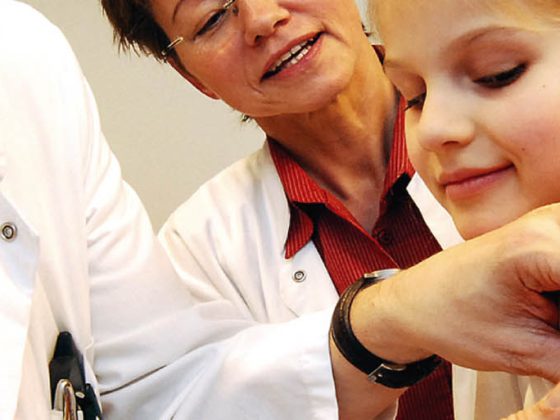At the Swiss Family Docs Congress, Prof. Rainer Weber, MD, Director of the Clinic for Infectious Diseases and Hospital Hygiene, Zurich, provided information on infectious disease topics in a well-attended seminar. He conveyed his credo very convincingly: because of increasing resistance, antibiotics must also be prescribed sensibly and cautiously in family practice – so that effective antibiotics will still be available in the future.
(ee) In discussions surrounding the development of antibiotic resistance, the focus is almost always on hospitals and intensive care units, because that is where patients end up who are infected with multiresistant germs. “Yet 50% of all antibiotics prescribed worldwide are not used in humans, but in veterinary medicine,” Prof. Weber emphasized. “And 75% of all antibiotics in human medicine are used in outpatient settings, not in hospitals.” The fact that animals bred to produce food receive so many antibiotics has a very direct impact on humans, because resistance is transferred from animals to humans through the handling of animals and the consumption of animal products.
Different levels of resistance are present on different continents, but travel spreads them rapidly. In recent years, no fundamentally new classes of antibiotics have come onto the market, and there will probably be nothing new in this area in the next few years either. This is one more reason to take care of the antibiotics that are still available at the moment and to prevent the spread of resistance as much as possible.
Helicobacter pylori
Most people infected with Helicobacter pylori (HP) do not develop any of the possible secondary diseases (ulcers, MALT lymphoma, gastric cancer). Ulcers occur in approximately 10% of infected individuals. HP eradication therapy does not only have advantages: It is not uncommon for antibiotic resistance to develop as a result, which at best only becomes manifest in a later infectious disease (“collateral damage”). Furthermore, there is evidence that diseases such as asthma, allergic rhinitis, cerebral strokes [1], and Barrett’s esophagus occur more frequently after HP eradication. Thus, HP infection also appears to exert some protective function against the host. In Switzerland, resistance rates to clarythromycin and metronidazole are relatively high, leading to treatment failure in affected patients.
Proton pump inhibitors (PPIs) should also not be used lightly, as eliminating stomach acid causes certain germs to occur more frequently. Studies show that the incidence of pneumonia is greater in patients receiving care in an intensive care unit who are receiving PPI.
Acute cystitis
“In acute cystitis, empiric therapy without further workup is appropriate at most for an initial infection,” the speaker said. At the latest when a woman comes with a second cystitis, it should be clarified in more depth. Those drugs recommended for cystitis treatment today will already have resistance rates of 10-25% in 5-10 years. This is another reason why targeted antibiotic treatment is useful.
Fosfomycin, nitrofurantoin, and cotrimoxazole are considered first-line agents. Although resistance rates to cotrimoxazole are relatively high, it is worthwhile to try therapy because acute cystitis is a harmless disease with a high tendency to self-healing and nothing is forgiven by trying therapy.
Asymptomatic bacteriuria should not be treated except in certain patient groups (pregnant women, planned urogenital tract surgery). This also applies to elderly people in nursing homes with bad-smelling urine – a urine status is pointless in such cases. There is no evidence of increased mortality in persons with asymptomatic bacteriuria. If asymptomatic bacteriuria in young women is treated with antibiotics, these patients have increased recurrences of UTIs [2], so it must be assumed that colonization of the urinary bladder with bacteria protects these women from UTIs.
Whether cranberry juice really has a preventive effect on urinary tract infections is controversial. There are about ten different studies in good journals that show no effect on the incidence of UTIs. In contrast, taking Lactobacillus appears to reduce the risk of urinary tract infections. The speaker called for trusting the clinic even when monitoring the course of urinary tract infections and not initiating unnecessary urine statics.
Respiratory infections
Acute tracheobronchitis is caused by bacteria in less than 5% of cases – so the administration of antibiotics is practically never of any use. Not even if the sputum is yellow, because this in no way indicates a bacterial (super)infection. 25% of patients with rhinovirus infection continue to cough for 14 days after symptom onset, so even this symptom does not mean that antibiotics need to be given. Of course, in practice, care must be taken not to miss pertussis, tuberculosis, or bronchial carcinoma in a prolonged cough, but overall these diseases are rare after all.
Determination of inflammatory parameters (CRP, procalcitonin) is usually useless in respiratory infections. In addition, the procalcitonin level is often still low at the beginning of bacterial infections. The decision whether or not to give antibiotics is based on the clinic. If pneumonia is suspected, a chest x-ray should be obtained; if it is not suspected, the x-ray and laboratory are omitted.
Concluding his presentation, Prof. Weber again appealed to physicians’ common sense: “By monitoring the clinic, unnecessary antibiotic use can be prevented.”
Source: Swiss Family Docs Conference 2014, August 28-29, 2014, Zurich
Further information: www.anresis.ch – Swiss Center for Antibiotic Resistance
Literature:
- Chen Y, et al: Association between Helicobacter pylori and mortality in the NHANES III study. Gut 2013; 62(9): 1262-1269. doi: 10.1136/gutjnl-2012-303018.
- Cai T, et al: The role of asymptomatic bacteriuria in young women with recurrent urinary tract infections: to treat or not to treat? Clin Infect Dis 2012; 55: 771-777.
HAUSARZT PRAXIS 2014; 9(12): 46-47











